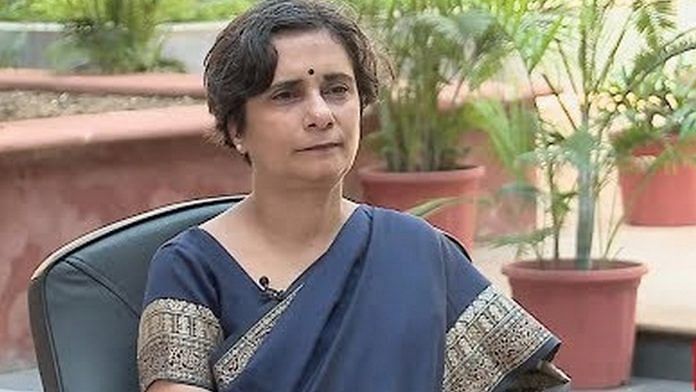New Delhi: The number of Covid-19 vaccine shots India needs to buy will depend on how coronavirus re-infections transpire, Gagandeep Kang, one of India’s leading medical scientists and vaccine experts, has suggested.
As a series of vaccines throw up promising results, Kang spoke to ThePrint about the impact the innovation will have on India.
She said it is too early to make an accurate assessment, adding that a lot depends on the extent of re-infections that occur among recovered Covid patients. She also described as “feasible” a suggestion made by AIIMS director Randeep Guleria that herd immunity — a stage where enough people are infected in a given area that the chain of infection is broken — may come before a Covid vaccine becomes available for all.
She also said emergency-use authorisations for vaccines is something that should not be rushed unless there is a supporting pool of data.
Talking about the immunity offered by Covid infection to patients, she said it needs to be tested.
“It is important to remember that vaccines are designed to induce the best possible immune response. We have data that shows immune responses vary by severity of illness,” she said.
“We do not know whether this equates to a difference in protection, but we will learn with time, as more previously infected people are exposed to subsequent infections,” she added.
The best answers about immunity offered by a previous Covid infection, Kang suggests, “could come from human-challenge studies in seropositive, previously infected individuals”.
A controversial line of assessment, human-challenge studies involve deliberately exposing test subjects to infections that a certain trial is aiming to achieve protection against.
Also Read: With Covid vaccine coming, Modi govt tells states & UTs to boost ways to report side effects
Things India needs to plan
Kang, the first Indian woman scientist to be picked as a Fellow of the London’s Royal Society, is currently a professor at Christian Medical College Vellore. She has several achievements in the field of vaccines, including playing an important role in the development of India’s indigenous rotavirus vaccine.
At the start of the pandemic, she was made the chair of a government panel on Covid-19 drugs and vaccines, but it was disbanded in April.
According to Dr Kang, the price of a vaccine, its efficacy, suitability for the programme and sustainable and timely supply should be the key considerations for it is bought.
Also, India needs to plan in advance the curbs and checks on possible fraud, she said.
“These are supply-chain and logistics issues, complicated by this being a high-value product (not in terms of price but perceived value), so issues of pilferage and fraud add to the complications of planning.”
She also listed certain factors that the central government should consider while designing the vaccine storage and distribution strategy, apart from ensuring adequate cold-chain storage.
“Location of immunisation camps and duration, information of identified persons, tracking their attendance, monitoring of temperature during immunisation sessions, trained staff for delivery of immunisation will play critical role,” she said, adding that all of it needs to be done without impacting routine immunisation activities.
“India has never seen this kind of scale in immunisation drives before. Hence, the government needs a strong communication strategy on informing the public and constantly sharing the updates.”
Also Read: Results of Covid vaccines ‘promising’, India will play key role in their production — ICMR
On emergency nod for vaccines
Among the vaccine candidates that have emerged as promising options is the AstraZeneca-Oxford endeavour that has an Indian partner in the Pune-based Serum Institute of India (SII).
SII CEO Adar Poonawala has been quoted as saying that the SII may get emergency-use authorisation for the vaccine by next month. Asked about emergency-use authorisations for vaccines, Kang urged caution.
“It would be completely inappropriate to have an emergency approval before we know for sure that the vaccine works somewhere in the world. Not just AZ (AstraZeneca), it applies to all vaccine candidates,” she said.
Asked about the parameters that need to be considered for the grant of emergency-use authorisation, she added, “In my view, we need to have chemistry manufacturing controls and immunogenicity data that show us that the vaccine made in India is equivalent to what is made by AstraZeneca, and then we can use AstraZeneca’s efficacy data for the regulator to consider emergency licensure.”
Also Read: Astra-Oxford delivers on Covid vaccine, but can’t match rivals Pfizer & Moderna



